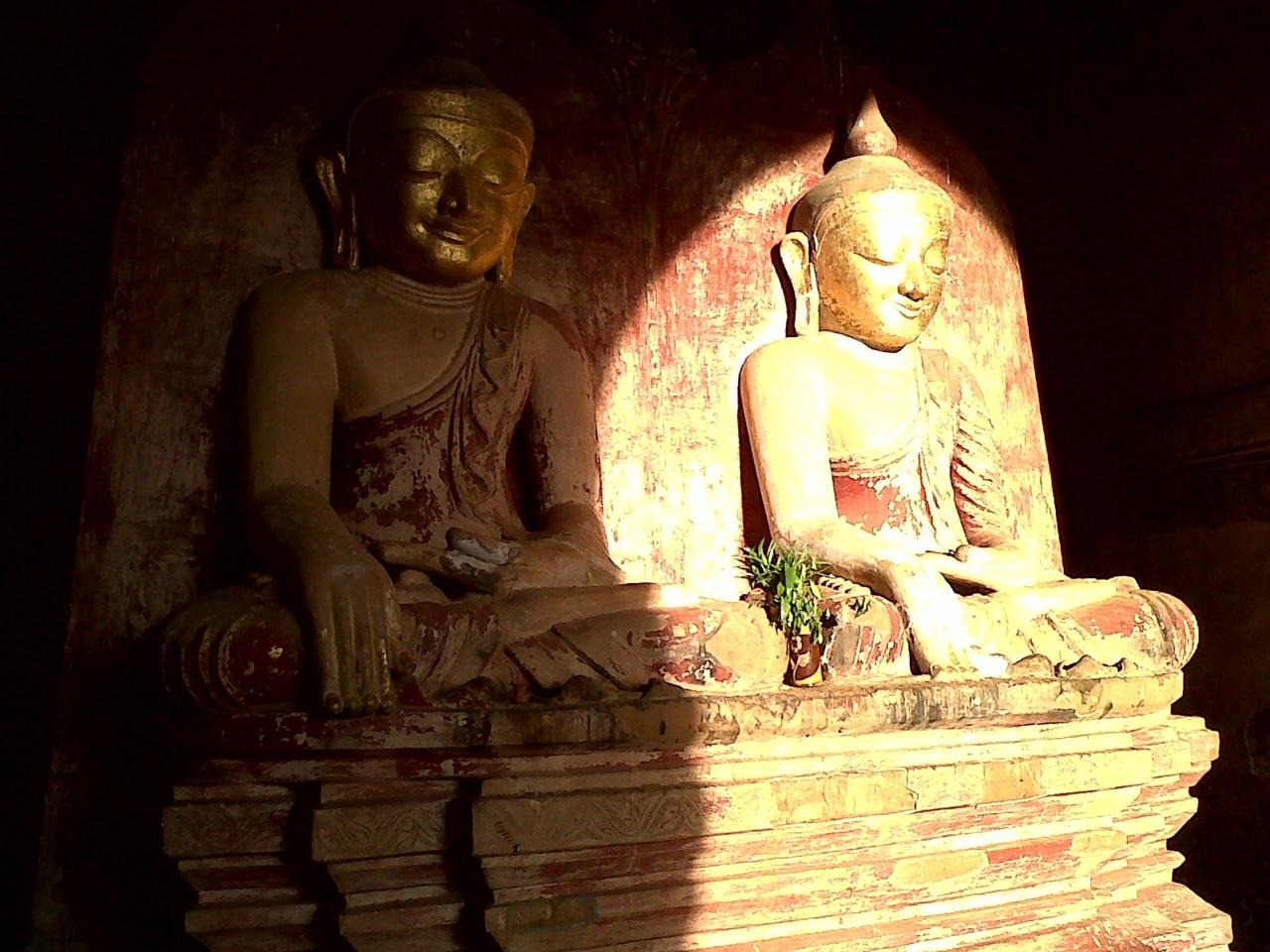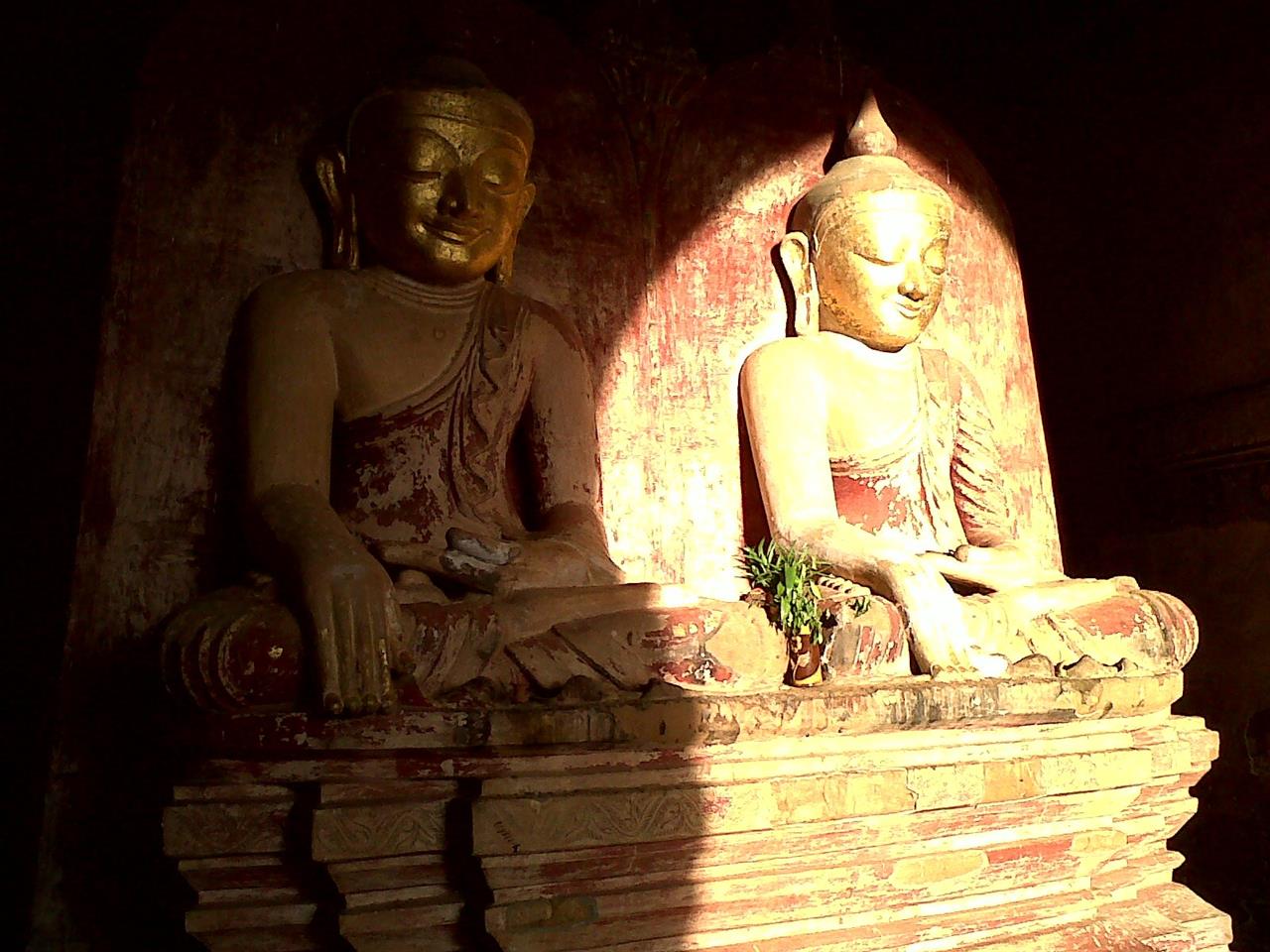
You would normally review your achievements and make the New Year’s resolutions in December, but I chose my summer break for such an exercise. As usual I must take my own path.
I spent the last 3 weeks in Myanmar cut off almost completely from modern life. BB doesn’t work, and neither do credit cards. Here is an episode to exemplify how unprepared I – globalised citizen – was, facing challenges in such a pre-modern environment.
As Dr Watson and I – actually Dr Darren, my travel companion – arrived at the Yangon International Airport to catch our flight back to Bangkok, we realised that we had purchased the tickets for the day before. Then we had to buy new ones but – Oops – it was the last day of our trip and we did not have enough $ left. We couldn’t use our credit cards, neither call the travel agency nor go online because there was not a computer terminal accessible to the public. After half an hour arguing with the staff of Air Asia who didn’t have a clue how to handle such a situation – they looked like it was the first time – we persuaded the counter assistant to let us use her computer to go on line and purchase 2 new expensive tickets. We succeeded just in time!
Despite the inconvenience of walking with pockets full of cash I had plenty of time for pondering between the visit of one Buddhist temple and another. I dived into a rural landscape that you can’t find in Europe any more, except in the early last century paintings and pictures.
The country opened its borders in 2011 after almost 50 years of isolation. The first free election has been planned for 2015 but already hotels, restaurants, and travel agencies are popping up everywhere tourists set foot. Capitalism is about to take over, even this last corner of the world… but it will speak Mandarin.
Burmese society has little in common with my usual metropolitan environment but it’s such a gap that gave me the space to breath and refresh my thoughts. Traveling in this country is like reading a Marxist author. It doesn’t teach you much about the world but helps you think out of the box.
Besides my loyal travel companion I brought 2 books to aid me in the task: The End of History and the Last Man by Francis Fukuyama and La Colomba Pugnalata (The stubbed dove) by Pietro Citati. I’m sure you know the first one that marked the apex of Western globalisation in ‘90s, but I doubt you have heard of the second one. It’s a poetic biography of the French writer Marcel Proust and a critics of his masterpiece À la Recherche du Temps Perdu (In Search of the lost Time).
Although unplanned, it turned out that both books are as intertwined with my past turning points as they are to my current one. Yes, this voyage became the opportunity for making a conscious change, both in my professional career and private life. But let’s start from the beginning of the story.
The first volume of La Recherche fell in my hands as I moved to Paris, leaving my family and home town Bologna, in ’96. I was 22. I discovered freedom in the French capital and my adult life started there.
Besides several explorations, not all cultural, I spent the following year reading the 5 volumes of Proust – one after the other one. I had never thought that I could find such an affinity in the sensitivity of another human being – especially someone dead decades earlier. That was not a book but a revelation. It was like reading my own confessions.
I didn’t feel a lonely stray dog anymore. I realised that there is hope for people like me and Proust, too different from the others to fit into society but not ruthless enough to shape it at our will. It took thousands of pages but the protagonist of La Recherche proved me that there is an happy ending for us as well. The secret lies in the meanders of our mind and its creations. The mind is the only refuge free from the trivial constraints of society. Its creativity is the only place where a new world can emerge to save us. When that world reconnects to reality the path to salvation is paved.
I came across Citati’s book on Proust few years later when I started my first job. I was 24 and had never thought I had to work like anybody else. I had never thought to be like everybody else, but realised then that my high self-esteem was not supported by appropriate means.
I started working with Adelina von Fürstenberg, organising a contemporary art exhibition to celebrate 50th Anniversary of World Health Organisation at the Triennale of Milan. I needed a job and a wage. I could not depend on my father support if I wanted to preserve my independence. But actually working was not so bad when you do what you like and I love art.
I found the La Colomba Pugnalata in Adelina’s flat. I started reading it in the work pauses but never finished it. I left for Geneva too soon. Citati seemed another one of our race. His book left me with an unaccomplished desire to verify my impression.
Fukuyama’s book had a similar misadventure. I bought it the same year when I move to Geneva but never started reading it. I bought another copy two years later but it ended up untouched on a shelf again. The similarity ends here as I had the impression that Fukuyama was a complete stranger to me but I was convinced to know the content of his famous book: the victory of liberal democracy and capitalism over all the other competing ideologies following the fall of Communism.
I was wrong. Actually both Fukuyama and Citati together helped me rediscovering a part of myself I left silent for far too long but now is re-emerging as a cycle of my life is closing and a new one is starting.
In my eight years in London, I accomplished the personal and professional journey I started reading Proust in Paris 15 years ago. London has given me the opportunity to explore in full my freedom, to experiment and enterprise. Here I found a city where you are rewarded if you succeed in daring and innovating. This attitude to risk and fast pace are virtues in the British capital. In London I found my natural environment.
It has been also a tremendous opportunity to develop my professional skills, test my ideas, develop my leadership and acquire awareness of my potential. I was tested on the ground and I passed the exam. Now I know how to reap the fruits of globalisation.
However, I forgot what matters the most to me, how I was raised and my favorite topics when I studied at the university. Adelina said that I’m someone in between an artist and a pirate. I’m passionate about creation as well as breaking boundaries. One goes hand in hand with the other one. I’m not driven by wealth and happiness. Pragmatism is not my philosophy. I just learned how to apply it.
The liberal theory of rationality – the rational choice – seems trivial to me, while I’m in search of the values that distinguish us human beings from the rest of nature; why we make history. I want to discover its secret and put it at work. I love ideas, nature, history and art. In London I discovered the beauty of politics as Plato described it in the Republic.
These few weeks helped me in reconciling with my origins. I’m not ashamed of being Italian anymore. On the contrary, I’m proud of my culture as well as resolute in not compromising with its decadence. I don’t adapt. I transform the environment. I need to create and I’m ready to risk for it. I don’t want a safe job. I won’t fit in, but create.
Perhaps these are just confused thoughts but I left Myanmar sharing something that I found in all the people I met there: a great hope in the future. It’s the hope that only the human beings who have to strive to improve their lives and their community feel strongly inside of their chests. I’m ready to fight again with the same hope in my chest.
17 centesimi al giorno sono troppi?
Poco più di un euro a settimana, un caffè al bar o forse meno. 60 euro l’anno per tutti i contenuti di VITA, gli articoli online senza pubblicità, i magazine, le newsletter, i podcast, le infografiche e i libri digitali. Ma soprattutto per aiutarci a raccontare il sociale con sempre maggiore forza e incisività.

